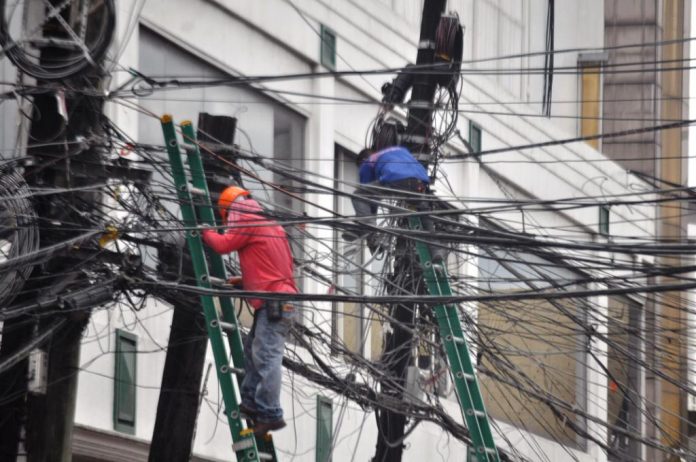
ILOILO City – Panay Electric Company (PECO) which has monopolized power distribution in this city for 95 years has failed the Ilonggos, according to billionaire businessman Enrique K. Razon Jr., a major stakeholder of MORE Electric and Power Corporation (MORE Power).
“If PECO had been doing a good job, we wouldn’t have had the opportunity to apply for this franchise and transform it into a modern, efficient, low-cost, and state-of-the-art distribution network,” he said.
On Wednesday night, MORE Power got majority votes from senators for its franchise application during its second reading, moving it closer to replacing PECO as power distribution utility in Iloilo City.
 “Four generations of Ilonggos have suffered under PECO. Neither are they heard by PECO, which has not addressed the many pending complaints – numbering 1,800 – against it,” said Razon.
“Four generations of Ilonggos have suffered under PECO. Neither are they heard by PECO, which has not addressed the many pending complaints – numbering 1,800 – against it,” said Razon.
The complaints included poor services, overcharging of power bills with some reaching more than 1,000 percent, accumulated billings due to erroneous meter readings, technical failures, poor customer service, high electricity rates, constant power interruptions, and unexplained charges.
“Clearly, it is time that the Ilonggos are relieved of their misery,” said Razon.
According to the businessman, PECO has one of the highest generation charges in the country, and is P2.50/kwh higher than in Manila, Cebu and Davao.
“Some nongovernment organizations even claim that Iloilo City’s electricity prices are the highest among 70 countries in the world. Yet, PECO has a low distribution charge. This is clear evidence that PECO has not made any meaningful investments in their facilities for decades,” said Razon.
Their distribution lines, transformers and substations are also probably 95 years old, he added.
As seen throughout Iloilo, PECO has undersized and crowded feeders, leaning poles, disorganized service drops, unsafe clearances of lines and substations and transformers.
“These have resulted in frequent power outages and service interruptions,” said Razon.
Contrary to what PECO had been claiming, said Razon, it had poor reliability indices.
“The System Average Interruption Frequency Index (SAIFI) of PECO of 31.15 is actually 1,400 percent above the Philippine average of 2.18. On the other hand, its System Average Interruption Duration Index (SAIDI) is 1,612 or 3,000 percent above the Philippine average of 54,” said Razon.
SAIFI shows how often a power interruption occurs in a franchise area. On the other hand, SAIDI indicates the average duration (in minutes) of a power interruption in a franchise area.
On top of these, Razon added, PECO’s systems loss in 2017 was 9.93 percent, the highest among private utilities in the Philippines.
“PECO is No. 20 in the list of distribution utilities in the Philippines, an indication of poor performance. Given that its franchise area is a compact and contiguous urban area, it should have been in the Top 5 or Top 10,” said Razon.
He also defended MORE Power from the criticism that it does not have the qualifications to run an electric company.
“We certainly never want to have the qualifications of PECO. We are exactly the opposite of PECO because we have a track record of success in start-ups and large-scale projects not only in the Philippines but globally,” he said.
Razon is also the president and chairman of the International Container Terminal Services Inc. (ICTSI) which is into the business of port development, management and operations and is established and headquartered in Manila.
ICTSI operates the Manila International Container Terminal in the Port of Manila, which is one of the major seaports in Asia and one of the most active ports in the country.
“PECO has become a rent-seeking business run by the family who are multiplying and draining the resources and earnings of PECO through dividends for themselves. They are a throwback to the hacienderos of lore. They behave like the franchise is a birth right. It is a privilege, not a right,” stressed Razon./PN





What he said is true. I am from Iloilo City. And I experienced overbilling and accumulated billings from PECO.
PECO SOP when it cones to complaints is that you must pay the excess bill on an installment basis on top of ypur monthly bill. This is fine if it there really was a fault but the problem was they don’t offer solutions. They don’t even suggest an investigation or give you due process for your complaint. Imagine we were consuming from 9,000 to 10,000 pesos monthly bill suddenly it went up to 16,000 pesos in one month WITH NO ARREARS.
I wish thst PECO will lost it’s franchise and also the people in the meter reading section, legal section and accounts section will lose their jobs in the process. They deserve to lose their jobs.
same here but not as much as 16000 though… saving electric consumption was always a conscious effrot to our family… It has become both a privilege and a curse especially when the bill comes at the middle of the month.
PECO really failed the people of Iloilo. Goodbye PECO the people of iloilo would love to see you go. The franchise is looooooooooong gone hahahaha! I hope you keep on lobbying and finish all your money lobbying for nothing.
Thank you MORE for coming to the rescue of the people of iloilo city. We welcome MORE with open arms. 🙂
Aboitiz offered to partner with them before but owners were too greedy. No investments made, all capital flight since Marcos’ time! Good ridance.